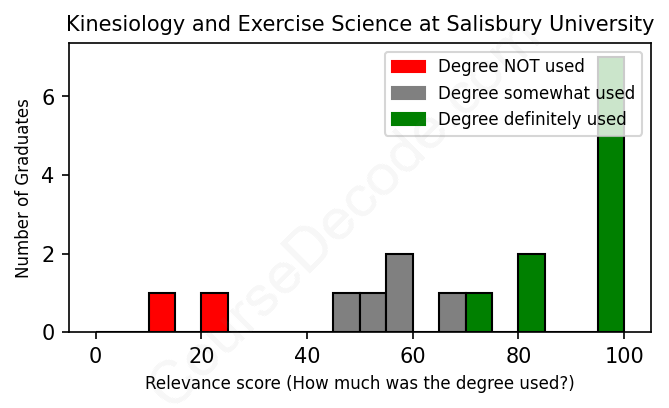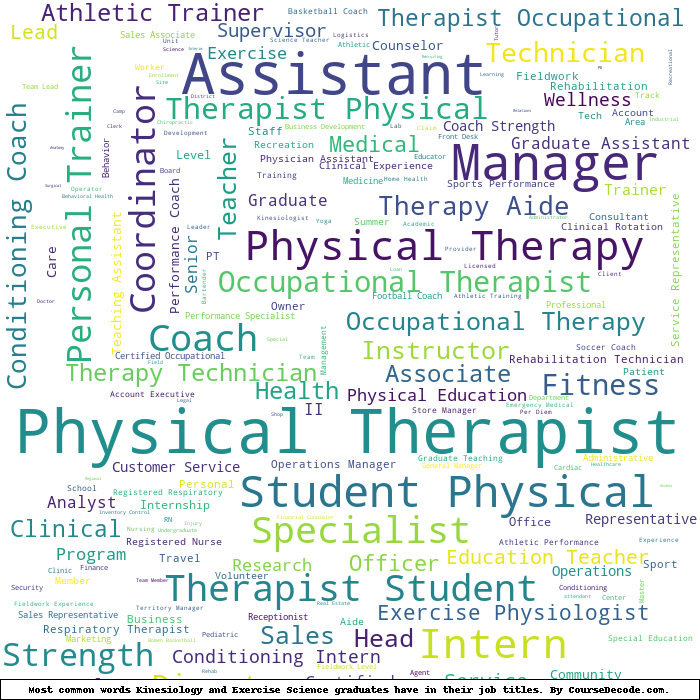
First, some facts. Of the Kinesiology and Exercise Science graduates from Salisbury University we've analyzed , here's how many have used (or NOT used) their degree in their career:

These are estimates based on AI analysis of 17 LinkedIn profiles (see below).
The verdict? Above average. Overall, with an average relevance score of 73%, Kinesiology and Exercise Science graduates from Salisbury University have a higher likelihood (+6%) of finding work in this field compared to the average graduate across all fields:
And for comparison, here's the chart for all profiles we've looked at across all degrees.
Also, after graduating, 35% of these graduates have pursued further education other than another Bachelor's degree (such as a Masters degree or other), which is right in line with the average across all fields.
See the details:
|
Relevance score: 50% We think this person has gone into a career only somewhat relevant to their degree. We think this person has gone into a career only somewhat relevant to their degree.
DEGREE INFOGraduated in 2012 from Salisbury University with a Bachelor of Science (B.S.) in Kinesiology and Exercise Science. No other secondary education since. JOB HISTORY SINCE GRADUATIONTherapy Tech Intern HealthSouth Jan 2012 - May 2012 ABOUT- As an Intern for HealthSouth my Senior Spring semester my goals were revamped to study nursing. As a therapy tech I aided in many basic aspects of therapy. My education in Exercise Science with a health minor aids me by allowing me to find alternative ways to manage risk factors and preventative modifications to improve quality of life. |
The top 10 most common jobs done by the graduates we've analyzed (ranked most common to least) are:
When it comes to graduates from Salisbury University with a degree in Kinesiology and Exercise Science, there's a pretty clear trend in the types of jobs they land. A lot of them find work in fields like personal training, physical therapy, and athletic training, which makes sense because these roles heavily rely on the skills and knowledge they developed during their studies. For example, positions like Physical Therapy Technician, Rehabilitation Technician, and Exercise Physiologist are all pretty much tailor-made for Kinesiology grads, as they directly involve applying what they learned about anatomy, movement, and fitness in real-life scenarios.
On the flip side, not all graduates ended up in jobs that are closely tied to their degrees. Some took paths like sales or administrative roles that don’t really touch on Kinesiology principles. Even some who work as personal trainers or in fitness management found themselves doing more administrative or operational tasks rather than hands-on training. So, while many Kinesiology graduates do find relevant positions in their field, there's definitely a chunk that veers off into unrelated areas, showing a mix of alignment and divergence in their career paths.
Here is a visual representation of the most common words in job titles for Kinesiology and Exercise Science graduates (this is across all Kinesiology and Exercise Science graduates we've analyzed, not just those who went to Salisbury University):

Graduates from Salisbury University with degrees in Kinesiology and Exercise Science seem to follow a pretty solid path towards careers related to their field. For many, their first job out of college often involves some level of hands-on experience, whether that’s as a personal trainer, a physical therapy aide, or a rehabilitation technician. These positions allow them to apply their academic knowledge right away. As they gain more experience, many of them transition into roles that carry more responsibility, like managers or specialized trainers, or even into educational roles like teaching. For instance, some graduates eventually become athletic trainers or professors, which highlights the potential for long-term career growth in the field.
However, it’s important to note that not everyone sticks closely to Kinesiology-related positions after a few years. Some graduates branch out into seemingly unrelated areas, such as sales or even the arts, which shows there's a mix of success stories and those who may not fully utilize their degree. Yet, it seems like a good number of people stay within the realm of physical therapy, fitness training, and wellness management, with many climbing the ranks to significant positions in those sectors within 5 to 10 years after graduation. Overall, the trajectory appears promising for those looking to build a career in Kinesiology and Exercise Science, but as with any degree, individual outcomes can vary greatly based on a person's choices and opportunities that come their way.
Honestly, a Bachelor’s degree in Kinesiology and Exercise Science can be a mixed bag when it comes to difficulty—it really depends on your strengths and interests. At Salisbury University, like many places, you'd be diving into subjects like anatomy, physiology, and biomechanics, which can be pretty challenging if science isn’t your thing. But, if you're into sports, fitness, or health, you might find the content engaging and manageable. Typically, it’s seen as a bit easier than some of the more hardcore science majors, but it still requires a solid commitment to coursework and labs. So, if you're passionate about the field, you’ll likely find it rewarding, even if it gets a bit tough at times!
Most commonly, in the LinkedIn profiles we've looked at, it takes people 4 years to finish a Bachelor degree in Kinesiology and Exercise Science.
Looking at the career paths of these Kinesiology and Exercise Science grads from Salisbury University, it seems like some have found pretty solid financial footing, while others might not be raking in the big bucks just yet. For instance, the assistant professor job sounds like a good gig with decent pay, especially compared to some of the personal training positions or interim gigs like being a substitute teacher. Many went from entry-level positions to specialized roles over time, indicating a potential for higher earnings in the long run, especially in fields like physical therapy or training. However, a few seem to be hopping around between lower-paying roles, like personal training or working as an aide, which probably doesn't offer the best paychecks right out of college. It really shows how varied the financial prospects can be in this field—some might be doing well while others are still paving their way!
Here is a visual representation of the most common words seen in the "about" section of LinkedIn profiles who have a Bachelor degree in Kinesiology and Exercise Science (this is across all Kinesiology and Exercise Science graduates we've analyzed, not just those who went to Salisbury University). This may or may not be useful:

Here are all colleges offering a Bachelor degree in Kinesiology and Exercise Science (ordered by the average relevance score of their Kinesiology and Exercise Science graduates, best to worst) where we have analyzed at least 10 of their graduates: